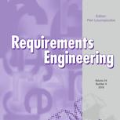The relevance of Requirements Engineering (RE) research to practitioners is vital for a long-term dissemination of research results to everyday practice. Some authors have speculated about a mismatch between research and practice in the RE discipline. However, there is not much evidence to support or refute this perception. This paper presents the results of a study aimed at gathering evidence from practitioners about their perception of the relevance of RE research and at understanding the factors that influence that perception. We conducted a questionnaire-based survey of industry practitioners with expertise in RE. The participants rated the perceived relevance of 435 scientific papers presented at five top RE-related conferences. The 153 participants provided a total of 2,164 ratings. The practitioners rated RE research as essential or worthwhile in a majority of cases. However, the percentage of non-positive ratings is still higher than we would like. Among the factors that affect the perception of relevance are the research's links to industry, the research method used, and respondents' roles. The reasons for positive perceptions were primarily related to the relevance of the problem and the soundness of the solution, while the causes for negative perceptions were more varied. The respondents also provided suggestions for future research, including topics researchers have studied for decades, like elicitation or requirement quality criteria.
翻译:要求工程(RE)研究与执业人员的相关性对于长期传播研究成果与日常实践的相关性至关重要。一些作者推测了RE学科的研究与实践之间的不匹配,但并没有多少证据支持或反驳这一看法。本文件介绍了一项研究结果,旨在从执业人员那里收集他们认为RE研究相关性的证据,并了解影响这种认识的因素。我们对具有RE专业知识的行业从业人员进行了问卷调查。与会者评价了在RE相关的五次最高级会议上提交的435份科学论文的明显相关性。153名与会者提供了总共2 164个评级。在大多数案例中,执业人员将RE研究评为基本或值得的。然而,非积极评级的百分比仍然高于我们所希望的。影响相关性认识的因素包括研究与产业的联系、使用的研究方法和受访者的作用。积极认识的原因主要与问题的相关性和解决方案的正确性有关,而负面认识的原因则更为不同。受访者还为未来研究提供了建议,包括研究者对数十年的质量标准进行了研究,例如考察或质量要求。





